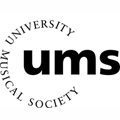While, during the first century of its existence, the University Musical Society almost exclusively hosted concerts of classically oriented Western music, in the last two decades it has been sponsoring more and more events with an increasing international flavor. In part, this is probably in recognition of the fact that UMS's audience, much like the demographics of the country as a whole, has grown more cosmopolitan and diverse, and continues to become more so. The concerts by the Panama-born Danilo Pérez whose group plays jazz with an international orientation and the Senegalese musician Baaba Maal, who plays West African music of an Afro- pop orientation that builds on traditional African music but is also inflected with Congolese, Afro-Latin and blues influences, illustrated this cosmopolitan trend that the UMS has been following.
First, the Danilo Pérez concert. Unfortunately, I had left my hearing aids at home (I remembered them only when I got on the bus for the concert and by then it was too late to go back and get them) and so I was somewhat handicapped as I was not hearing very well. Fortunately, the Hill Auditorium acoustics are very good, and the performers were all miked (a controversial issue, if you check out the posts at umslobby.org -- but which worked well for my situation).
I had been very curious to see Rudresh Mahanthappa, the saxophonist with Danilo Pérez, as he has been making big waves recently, especially in his ensemble work with Vijay Iyer. (Iyer and Mahanthappa will be playing together next Fall under UMS's auspices). Being as I am from India myself, I was especially curious to hear Mahanthappa play, as I had read that he brings Indian classical music, especially Carnatic music, influences to his playing. Actually, during one piece during Thursday's performance, Mahanthappa's saxophone seemed to provide the organizing principle and it definitely seemed inspired by a Indian classical musical sensibility.
I had been a little less enthusiastic about how the concert had been billed by UMS as "Twenty-first century Dizzy". That made the concert seem derivative: while Dizzy Gillespie was a great musician, jazz is ever-changing and forward-looking; so, to confine a musical description to the constraints of a "big name" from the past seemed somewhat like a marketing gimmick and also unfair to the musicians. Danilo Pérez is a superb musician in his own right, and to associate Dizzy's name with the concert in the way it was marketed seemed to me a trifle odd. In any case, Danilo Pérez played very well, and so did the other musicians, who all have very varied backgrounds.
I would suggest to UMS, though, that the Power Center (or even the Michigan Theater) might have been a better venue for jazz concerts of this kind than the Hill Auditorium. First of all, all too many seats remained empty at the capacious Hill for this concert, making the musical energy seemingly dissipate somewhat, whereas, in a venue like the Power Center or the Michigan Theater, the same size of audience packed into the smaller space of those venues would likely have contributed to a much more contagious and electric musical energy of the kind that feeds off a full crowd.
Finally, I have to report a problem that really drives me up the wall: too many people seemed to be checking their ipods or phones during the concert. Although the UMS is meticulous about asking people to turn off their cellphone ringers, maybe it should also ask people to desist from checking emails or otherwise using their phones or ipods during concerts, as the backlit blue screens of these devices happen to be very distracting to the people sitting in the row behind the people using them. Are people's attention spans so short these days that they cannot even last a concert's span without feeling compelled to check their email?
Next, let's talk about the Baaaba Maal concert of last Saturday. After Nomo, the African-music-inspired world music fusion band originating from Ann Arbor opened for them with a solid performance, Baaaba Maal and his entourage of Senegalese musicians, each wearing a flowing African robe of a different color, took the stage. The ever-smiling Baaba Mal, with his serene and melifluous voice, singing and speaking inspiring music and words calling for African unity and advancement, was a regal presence, and the audience participation was overwhelming. It seemed that a large body of the West African disapora in the South-Eastern Michigan area had turned up for the concert, many of them dressed in traditional costume, and kept climbing up on to the stage to dance energetically at every opportunity that presented itself. During the concert, Baaba Mal sang mostly in an African language that, I believe, was probably the Pulaar language. (The one song that I recognized was his song "Television" from his recent album. In course of the concert he introduced Mansour Seck, his bandmate, a blind Senegalese musician who has been a friend and influence on him since his earliest days as a musician, and who provided the backing vocals at this concert. The very tall Momadou Sarr, playing percussion both western and traditional, and Massambla Diop playing the talking drum, were also bundles of coiled musical energy.
